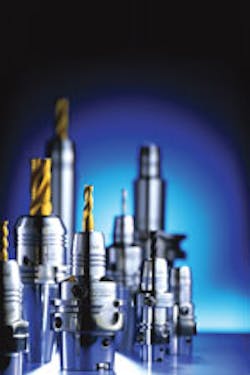Hydraulic Expansion Toolholders Need No Intermediate Sleeves
The Tendo line of hydraulic toolholders has a precision application for most manufacturing processes.
SCHUNK Inc. has redesigned its Tendo brand of hydraulic toolholders to make it capable of clamping different types of cutting tools with cylindrical shanks directly in the toolholder, without using intermediate sleeves. According to Schunk, this makes the new design “even more universal,” capable of various tasks and able to transmit up to 15% more torque.
The Tendo line of hydraulic toolholders has a precision application for most manufacturing processes, including high-speed machining and fine milling, heavy-duty milling, wood machining, internal grinding, boring and chamfering, precision reaming, and precision tool grinding. Tendo intermediate sleeves make it possible for operators to clamp different shank diameters into the same toolholder, to achieve flexibility and tooling cost savings. All Tendo hydraulic toolholders are completely closed systems that operate free of dirt, coolants, lubricants, and chips, and they are optionally available with micro-precise, radial length adjustment.
The well known and proven advantages of Tendo Hydraulic Toolholders remain unchanged, according to Schunk. A steel sleeve surrounded by hydraulic fluid performs the clamping of the cutting tool. When initializing the clamping process, an internal piston forces the hydraulic fluid into a cavity surrounding the steel sleeve: high pressure uniformly forces the sleeve around any cutting tool shank.
Cutting tools with different shanks are held with great concentricity — less than 0.003 mm run-out, Schunk notes.
The significant clamping pressure displaces oil or grease into the Tendo groove in the clamping bore. The clamping areas remain dry and high torque transmission is guaranteed at all spindle speeds.
Also, the hydraulic system absorbs inherent vibrations of the cutting or grinding processes, and the result is “very high T.I.R. accuracy and repeatability of less than 3 microns (0.00012 in.)”
With the new design toolholder, tool life is extended up to four times and surface quality of machined parts is significantly improved, according to Schunk.
